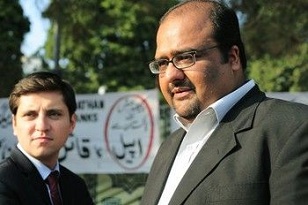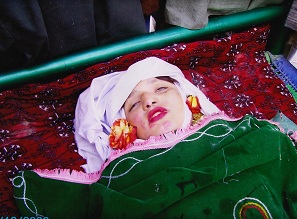Obama Administration Silencing Pakistani Drone-Strike Lawyer

Lawyer Mirza Shahzad Akbar (right)
When is the last time you heard from a civilian victim of the CIA’s secret drone strikes? Sure, most of them can’t speak because they’re deceased. But many leave behind bereaved and angry family members ready to proclaim their innocence and denounce the absence of due process, the lack of accountability, the utter impunity with which the U.S. government decides who will live and die.
In the wake of the 9/11 attacks, the U.S. government has increasingly deployed unmanned drones in the Middle East, South Asia and Africa. While drones were initially used for surveillance, these remotely controlled aerial vehicles are now routinely used to launch missiles against human targets in countries where the United States is not at war, including Pakistan, Somalia and Yemen. As many as 3,000 people, including hundreds of civilians and even American citizens, have been killed in such covert missions.
The U.S. government will not even acknowledge the existence of the covert drone program, much less account for those who are killed and maimed. And you don’t hear their stories on FOX News, or even MSNBC. The U.S. media has little interest in airing the stories of dirt poor people in faraway lands who contradict the convenient narrative that drone strikes only kill “militants.”
But in Pakistan, where most strikes have occurred, the victims do have someone speaking out on their behalf. Shahzad Akbar, a Pakistani lawyer who co-founded the human rights organization Foundation for Fundamental Right, filed the first case in Pakistan on behalf of family members of civilian victims and has become a critical force in litigating and advocating for drone victims.
Akbar is by no means anti-American. He has traveled to the United States in the past, and has even worked for the U.S. government. He was a consultant with the U.S. Agency for International Development, and helped the FBI investigate a terrorism case involving a Pakistani diplomat.
But his relationship with the US government changed in 2010, when he took on the case of Karim Khan, a resident of a small town in North Waziristan who claimed that his 18-year-old son and 35-year-old brother were killed when a CIA-operated drone struck his family home.
“Khan could have responded by taking up arms and joining the Taliban. Instead, he put his trust in the legal system,” Akbar told me in an interview from Islamabad. Akbar helped Khan sue the CIA and the US Secretary of Defense for the wrongful deaths of his relatives. Since then, dozens of families have come forward and joined the legal proceedings.
According to the New America Foundation, from 2004-2011, between 1,717 and 2,680 individuals were killed in Pakistan by drone strikes, and of those, between 293 and 471 were civilians. The UK-based Bureau of Investigative Journalism puts those figures higher, saying that some 3,000 have been killed, including between 391 and 780 civilians.

Drone victim Noor Syed (Photo: Noor Behram)
"Akbar disputes even the Bureau’s figures, claiming that the vast majority of those killed are ordinary civilians. “Most of the victims who are labeled militants might be Taliban sympathizers but they are not involved in any criminal or terrorist acts,” Akbar said. “The Americans often use the fact that someone carries a weapon as proof they’re a combatant. If that’s the criteria then the US will have to commit genocide, because all men in that area carry AK-47s. It’s part of their culture.”
Now that Akbar has become the voice of drone victims, it appears that the Obama administration is trying to silence him.
He was invited to speak at a human rights symposium at Columbia University’s law school in May 2011, but he never received a visa. Despite repeated enquiries, he was merely told there was “a problem” with his application. Now he has been invited to speak at the first ever Drone Summit on April 28-29 in Washington DC, organized by the peace group CODEPINK and the legal advocacy organizations Reprieve and the Center for Constitutional Rights. Once again, his visa remains stuck in the never-never land of “administrative review.”
The Summit organizers have appealed for help from the State Department, key members of Congress and the U.S. Embassy in Pakistan. After looking into the case, U.S. Deputy Ambassador to Pakistan Richard Hoagland responded: “Whether we like it or not, the current U.S. visa system faces significant constraints within the Homeland Security structure.” Insisting that the issuance of visas was not used as an ideological tool but was a reflection of “complicated and even byzantine laws and regulations,” Hoagland concluded, “I fully sympathize, but I cannot change law and regulation.” His recommendation? “Continued patience.”
“The Obama administration has already launched six times as many drone strikes as the Bush administration in Pakistan alone, killing hundreds of innocent people and devastating families,” [said Leili Kashani, Advocacy Program Manager at the Center for Constitutional Rights, one of Summit sponsors.] “By refusing to grant Shahzad Akbar a visa to speak at the Summit, the Obama administration is further silencing discussion about the impact of its targeted killing program on people in Pakistan and around the world.”
The Drone Summit’s organizers vow to keep pressuring the U.S. government to grant Akbar a visa and are encouraging their supporters to contact Consul General Steve Maloney in Pakistan. If all fails, they will have Akbar speak, via satellite, at a press conference at the National Press Club on Thursday, April 26, just before the Summit begins.
“Our legal challenges disrupt the narrative of ‘precision strikes’ against ‘high-value targets’ as an unqualified success against terrorism, at minimal cost to civilian life,” [said Akbar,] “The CIA does not want anyone challenging their killing spree, but the American people should have the right to know.”
___________________________________________________________________________________

Medea Benjamin is cofounder of the human rights group Global Exchange and the peace group CodePink. Her new book is Drone Warfare: Killing by Remote Control. She also is author of the Don’t Be Afraid Gringo: A Honduran Woman Speaks from the Heart. Please register here for the Drone Summit on April 28-29.
Medea Benjamin has been an advocate for social justice for more than 30 years. Described as "one of America’s most committed -- and most effective -- fighters for human rights" by New York Newsday, and called "one of the high profile leaders of the peace movement" by the Los Angeles Times, Medea has distinguished herself as an eloquent and energetic figure in the progressive movement. In 2005 she was one of 1,000 exemplary women from 140 countries nominated to receive the Nobel Peace Prize on behalf of the millions of women who do the essential work of peace worldwide. In 2010 she received the Martin Luther King, Jr. Peace Prize from the Fellowship of Reconciliation.
Since the September 11, 2001 tragedy, Medea has been working to promote a U.S. foreign policy that would respect human rights and gain us allies instead of contributing to violence and undermining our international reputation. In 2000, she was a Green Party candidate for the California Senate. During the 1990s, Medea focused her efforts on tackling the problem of unfair trade as promoted by the World Trade Organization. Widely credited as the woman who brought Nike to its knees and helped place the issue of sweatshops on the national agenda, Medea was a key player in the campaign that won a $20 million settlement from 27 US clothing retailers for the use of sweatshop labor in Saipan. She also pushed Starbucks and other companies to start carrying fair trade coffee.
Her work for justice in Israel/Palestine includes taking numerous delegations to Gaza after the 2008 Israeli invasion, organizing the Gaza Freedom March in 2010, participating in the Freedom Flotillas and opposing the policies of the Israel lobby group AIPAC. In 2011 she was in Tahrir Square during the Egyptian uprising and In 2012 she was part of a human rights delegation to Bahrain in support of democracy activists; she was tear-gassed, arrested and deported by the Bahraini government.
___________________________________________________________________________________
Her articles are published here: CodePink
URL: http://www.a-w-i-p.com/index.php/2012/04/09/obama-administration-silencing-pakistani
























